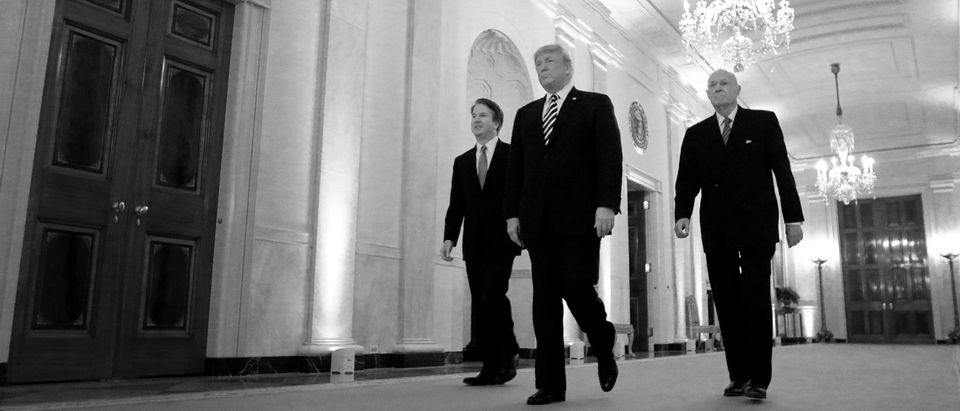“If a tree falls in a forest and no one is around to hear it, does it make a sound?”
“If a president robs a bank, would the president be investigated and charged with a crime?
The first question is considered a philosophical thought experiment; the answer to the other is central to the future of American democracy. The Department of Justice, the U.S. Congress, and the Supreme Court will all play a role in ultimately deciding the answer. Whatever the answer is, it will determine what kind of life you, your children and grandchildren will lead. Here’s why.
A legal opinion memorandum issued by the Department of Justice, Office of Legal Counsel in October 2000 concluded that a sitting president is immune from indictment and criminal prosecution. As long as this legal memo is operational and enforced at the DOJ, there is no mechanism to hold a president accountable except through impeachment. That is made clear by the 68 references to impeachment made in the OLC opinion. Its final sentence reads: “Where the President is concerned, only the House of Representatives has the authority to bring charges of criminal misconduct through the constitutionally sanctioned process of impeachment.”
But what if the Senate is so politically polarized that removal from office by impeachment conviction is unattainable? If that is the case, then I believe the DOJ has flung the criminal laws of the nation out the window when it comes to a sitting president. In fact, it is being used as I write this by President Trump’s private attorney to argue the president is above the law and can commit as many crimes as he wants without being investigated or prosecuted while president. If that is the case, we are in a very dangerous situation.
The OLC memo, until withdrawn or rewritten, has been cited as controlling authority by the DOJ (and by implication in Special Counsel Robert Mueller’s report) even though there is no law or judicial opinion that has ever been enacted or issued on the matter. And the Constitution makes no reference to any prohibition on criminal indictment and prosecution of a sitting president
And now President Trump’s private attorney takes the memo’s conclusion a giant step further before the U.S. Court of Appeals for the 2nd Circuit in a case involving the subpoena of Trump’s tax records by New York state authorities. The attorney argues Trump has “temporary immunity” from investigation or prosecution of any crime he might commit as long as he is president. In other words, unless the congressional impeachment process were to result in a successful two-thirds vote for conviction and removal of the president by the Senate, not only would impeachment and removal be disallowed but so would the investigation and prosecution of the underlying state or federal criminal offense itself.
The Trump attorney’s argument that a president has “temporary presidential immunity” is rooted in the so-called unitary theory of executive power. It is as obscure as it is controversial. It is a judicial viewpoint that proponents argue is found in Article II of the Constitution: “The executive power shall be vested in a President of the United States of America.” Those words have been variously interpreted to theoretically invalidate any statute denying the president “exclusive control” over a “purely executive” power and thus deemed a violation of the principle of the separation of powers in the Constitution.
Other supporters of the theory take a more extreme view. They consider independent government regulatory agencies to be illegitimate as they were structured to insulate them from presidential control. They believe congress has no power to demand information from any part of the executive branch and that the executive power, under the Constitution, gives the president all that power unchecked by congress or the courts.
If the president was the only one who could determine what presidential powers existed, not only could the president act when congress had not spoken on a given topic but his action would be considered to be constitutional even in the face of congressional opposition. Richard Nixon pretty well summed up the theory this way: “If the president does it, it must be legal.” Trump, through his statements and actions as president, has confirmed his acceptance of Nixon’s dicta.
The proponents of the unitary theory of executive power have constructed an alternative constitution much like Trump’s use of alternative facts. Trump’s attorney has taken what many consider a crackpot theory regarding the Constitution to argue the court should give any president a get out of jail card. This argument is being made in real time in a federal court whose decision will undoubtedly be reviewed by the U.S. Supreme Court, perhaps by the end of this year.
When faced with this monumental decision, would the Supreme Court codify the theory into law, and by doing so, hand President Trump the keys to the kingdom and make him, effectively, a king? Or will members of the Senate recognize the consequences of what their extreme partisanship has wrought? If the Senate is unable to conduct a serious impeachment trial without ranker or political prejudice it will allow its own constitutional authority to be usurped by the executive branch at the hands of the judiciary.
This moment is about more than President Trump. It is more than the political future of individual senators. Rather, it is about the future of our democracy, the rule of law, our national security and the kind of lives our children and grandchildren will be able to live.
Tom Coleman represented Missouri as a Republican in the United States House from 1976-1993. He has taught as an adjunct professor at New York University’s Robert F. Wagner Graduate School of Public Service and at American University in Washington, D.C.
The views and opinions expressed in this commentary are those of the author and do not reflect the official position of The Daily Caller.


